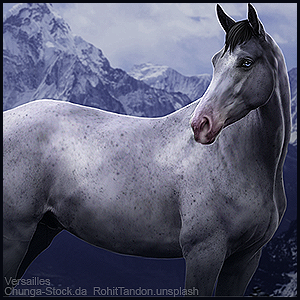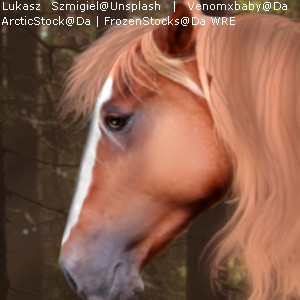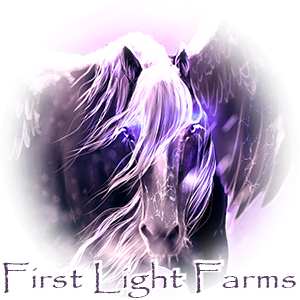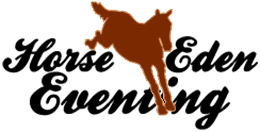| |

Rumble Team |
I bought this horse almost two years ago. A little Morgan gelding, he'll be six in August, his name is Diago. Anyways, his backstory is a little rough but not bad. I started him and have done all his training, he's a great horse, and has done really well. He just has a little aggression that I'm not sure how to help. His aggression almost completely revolves around food, which is understandable he had to fight a lot of horses for food. He was also a stallion for most of his life. He has bit three people, myself included. But not recently. I've been working with him, he responds well to pressure, will move out of your space, but he still makes a lot of threats, pinned ears, bared teeth sometimes, but hasn't acted on anything. One of my other geldings, acts aggressive but would never hurt you. Diago seems a little to aggressive to be in that same category. It gets worse when he's not ridden, so I think part of it may be boredom, but I don't know how to help him. He lives in an acre pasture, and has been offered balls and things to okay with, but refuses. Anyone have any tips? |
|  |
|
| |

|
When I first got my horse, he was pretty food aggressive, what I did was everytime he got fed was send him out (get him away from the food, and keep him away from it until I tell him 'ok come eat')
Clicking and swinging the lead rope normally works, but if your horse is really pushy, a lunge whip might be better (not to whip them of course, but its longer and you can make the snappy sound with it) If he charges towards you, pins his ears, etc send him out again Also a sort of controversial thing to say, but if my horse bites Ill smack him. Hes bitten me once on purpose, smacked his shoulder and hes never done it again. I use primarily positive reinforcement, but I draw the line at aggressive behaviors (obviously I'll make sure its not happening because they are experiencing pain/medical problems) I'd suggest to do tons of groundwork with him, lunging, backing up, side stepping, yeilding front and hind quarters, etc. to get his mind working. If theres trails near you, go out on them hand-walking or under saddle so he can see new stuff, and go on little adventures with him.
In the saddle if my horse is fresh I'll do lots of circles and serpentines, backing up, changing direction, etc. get their brain working and focused on what I'm asking them to do Personally if your horse is making threats I'd first get them out of your space, and then get their feet moving. Lunging, backing up, etc. (dont overdo lunging though, it can get them pretty bored, so I like to do lots of other groundwork exercises) I'd also get him checked out by a vet (if you haven't already) because he could be acting like this because he's in pain. And this stuff might not work with your guy, this is just stuff that has worked for me and my horse and horses I've worked with. |
|
|
| |

|
I agree with Lucky Ranch. I had a young ASB gelding that was aggressive around food and when he was being asked to work if he got a little tired. I've found that making them wait to eat until you okay it helps. I have also found that strict groundwork works wonders, and what I mean by that is no "lovey dovey" and "babying" for a while, which was super difficult since I love to love on my horses. If you by any chance have any questions or want more details on how I handled him feel free to pm me! :) |
|
|
| |

Rumble Team |
We spent some time on groundwork, and he responds well to pressure, he will back up and I make sure he's out of my space and being respectful before he gets his food. Right after he bit my mom, we went in with a lunge whip just to be safe but we haven't had to in a while. He's much better with consistent work, but with the frozen ground and ice that just isn't possible right now, so he's got a lot of energy. |
|  |
|
| |

|
I dont know how you feed but when I pull any of my horses to there stall to feed, they are expected to back up to the very back of the stall as soon as I walk in it. They are expected to stay there until after I leave. They can pin their ears, and I have one mare who wont even look at me 😂. But they know they better not take even a step towards me. Sort of same for throwing hay in pastures. They better be a good ways away before I throw a flake out for em. I teach this step by step. Walk in and push them back. Once they stay back, leave let them come back up. Repeat until you can go to there feed bucket and walk out comfortably without food. Then, add a scoop, or an empty one and repeat process |
|  |
|
| |

Rumble Team |
They have an acre pasture and a big run in shed for shelter, so it's all open but they each have their spots that they eat. He's been better. He just has very pinned ears, but is willing to back up and be out of my space. I haven't noticed it escalating and he's very polite in all other aspects, just if you have grain in your hand |
|  |
|
| |

|
Hey, Like you said This problem may be rising from boredom, I ussually find thats the main cuase of issues like this. Horses in the wild compete for food and mares ultimatly since he was a stud and was in a bad situation this means he still has some of those bad habits left. You said you did lots of work with him and thats amazing and I would try and gve him A job everyday and switch it up, often Horses can get bored of the same thing days on end and will become sour and seek out new thing to do, for him that may be trying to "compete for his food" only with you. I like to change the groundwork I do with them everyday and make sure that I can give them a job they can focus on it could be as small and simple as taking them for a walk or teaching them new cues or even tieing. I often find that If they show you aggressive behavour towards food take them out work them for 20 minutes put them back in and if they do it again do the same advetually he will learn if im rude I get worked if im not get fed. |
|
|
| |

Trivia Team |
Is it possible he has ulcers? Grain can be hard on their stomachs, especially if they have ulcers, so it would explain the agression at feeding time. |
|  |
|
| |

Rumble Team |
Possibly, but I doubt it. I feed a very forage based diet. So even the grain is alfalfa pellets, linseed, barley, peas, black oil sunflower seeds, and beet pulp. And he shows no other signs while he's eating, when brushing, girthing, anythingm |
|  |
|

